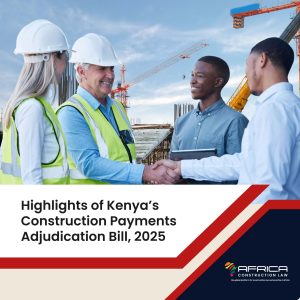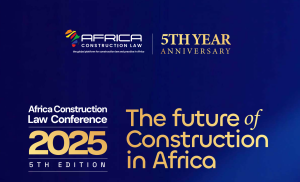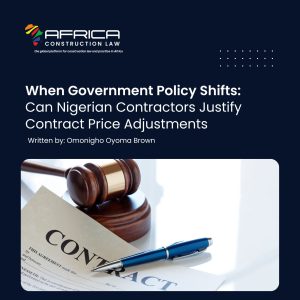ADJUDICATION AS A FORM OF DISPUTE RESOLUTION IN RESPECT OF CONSTRUCTION DISPUTES – FOCUS ON KENYA AND MAURITIUS[1]
[1] By King Thomas – Partner, Pinsents Masons South Africa and Roberts Carmen – Pinsents Masons South Africa
As you may have seen in the article published by our colleagues Thethe Mokele and Kirsten Gilbert-Dempsey, “Treatment By Courts, of Adjudication, as an Alternative Form of Dispute Resolution In Construction Disputes – South Africa, Tanzania And Namibia” and as touched on by Adeola Agunbiade-Adeyemi in her article “Construction Adjudication In Nigeria: Navigating The Enforcement Landscape”, the world of construction adjudication is an ongoing topic of conversation – and for good reason.
The exponential growth of construction projects to address the infrastructure deficit in Africa has highlighted a need for state backed alternative dispute resolution (“ADR”) processes that seek to aid the construction process. Adjudication is one such form of ADR which can expeditiously resolve conflict, through the decision of an unbiased and sector knowledgeable third party. Adjudication has proven very popular in other jurisdictions around the world and is effective at keeping projects moving forward and relatively free of the log jams often caused by bureaucratic and lengthy litigation procedures.
In continuing the conversation around adjudications in Africa, we now explore the landscape of Construction Adjudications in Kenya and Mauritius.
Adjudication in Kenya
Much like many of the jurisdictions in Africa, Kenya has yet to implement a statutory framework which regulates construction adjudications specifically, despite adjudications playing an informal role in the resolution processes of construction projects for many years in the jurisdiction.
The Civil Procedure Act 2012 (the “CPA”) took a helpful step towards ADR in that it expressly provides that “any settlement arising from a suit referred to any other alternative dispute resolution method by the Court or agreement of the parties shall be enforceable as a judgment of the Court” (Section 59C (3) of the CPA). However, while the CPA does make provision for ‘any other’ alternative dispute resolution processes which either party or even the court may refer the matter to, the CPA does not make provision for an adjudication mechanism specifically. Indeed, the CPA also does not automatically apply to construction contracts.
Instead, adjudication is more commonly seen as part of the more globally recognised international standard form contracts utilised on construction projects in Kenya. However, while there are suites of construction contracts which are used in Kenya which provide for adjudication as a dispute resolution mechanism (such as the recognisable FIDIC and NEC standard forms, for example), one of the most commonly used standard form contracts on domestic projects, the Joint Building and Construction Council Green Book (1999 edition), does not include such a mechanism. A new edition has been expected for many years to respond to this gap by including a clear and industry acceptable adjudication ADR mechanism for the resolution of construction disputes, however the implementation of that new edition has stalled.
In Kenya, where adjudication is adopted as a form of ADR, the conduct of such proceedings are largely regulated by the Dispute Board Rules framed by the Chartered Institute of Arbitrators (Kenya) (“CIArb”), although other rules (such as the FIDIC suite’s standard procedural rules) are also adopted. Article 4 of the CIArb Dispute Board Rules provides that the DAB’s decision “shall be enforceable and will stand unless superseded by agreement, arbitration or a judgement of the courts”.
No appeal shall lie in respect of any judgment entered into under Section 59C [Other alternative dispute resolution methods] of the CPA. However, as adjudication is not mentioned specifically in the CPA, it is unclear whether this Section is intended to apply to contractual adjudication processes, such as those regulated by the CIArb’s rules. Therefore, if parties do not want to take the risk of enforcement of adjudication awards in Kenyan courts, one alternative is to specify that the contract is to be governed by the law of another, adjudication friendly, jurisdiction (such as South Africa), although of course a number of other relevant factors will apply when considering which governing law is to apply.
Adjudication in Mauritius
Perhaps ahead of its time from an African context, and in response to the proliferation of development on the island, Mauritius is said to be in the process of enacting legislation to provide statutory adjudication in the construction industry under the enactment of the Construction Bill. This is a notable effort to facilitate a more efficient middle ground to the historically well-established court litigation system as the main avenue of recourse for construction disputes.
While this is a step in the right direction, the status of said legislation remains murky, with reports dating back to at least 2016 with little to no notable updates as to its progress and/or status thereafter. What this means for contracting parties in construction projects is that in the absence of agreement in the contract to the contrary, the only legislated alternatives to litigation are arbitration and mediation.
While adjudications in Mauritius may not be completely uncommon in the context of construction contracts, as in Kenya they are more commonly imposed by contractual agreement under the commonly used FIDIC Conditions of Contract, the JCT, the East African model and the World Bank Standards Conditions of Contract, amongst others.
Again, in the absence of statutory legislation, there is little Mauritian jurisprudence to guide parties in enforcing awards rendered through contractual adjudication processes. However, some comfort can be gained from the Mauritian courts’ approach to the enforcement of arbitration awards. Mauritius is a pro-arbitration jurisdiction and the Civil Procedure Code 1808 (Code de Procédure Civile), regulates the enforcement of domestic arbitrations. With respect to international arbitrations seated in Mauritius, the local Courts will not intervene except to support the process in line with the International Arbitration Act.
Similarly, in Mauritius the Mediation Division of the Supreme Court has the jurisdiction and power to mediate any civil suit, action and matter before the Supreme Court governed by the Intermediate Court Rules.
So one might expect the Mauritian courts to be sympathetic towards the enforcement of adjudication decisions, however in the absence of the promised legislature, adjudication will only apply to a construction contract where the parties expressly cater for that mechanism and uncertainty will prevail in relation to the enforcement of any awards rendered through adjudication.
Conclusion
While great strides are being made towards a more developed ADR framework in both Mauritius and in Kenya, arbitration and court litigation often remain the predominant recognised fora in which to resolve a construction dispute. Those mechanisms are often lengthy and expensive and do not lend themselves to the fast paced demands of construction projects.
Because of the absence of state mandated adjudications, most projects in Kenya and Mauritius involving international parties will tend to include bespoke adjudication mechanisms (often based on the most common standard form contracts) in order to bridge the gap. However, as Africa continues to develop as a construction power house, legislated effective ADR mechanisms like adjudication are needed in developing nations such as Kenya and Mauritius in order to ease the pressure on local court and arbitration processes, and to satisfy the demands of international players who require procedural certainty in the jurisdictions in which they operate.
[1] By King Thomas – Partner, Pinsents Masons South Africa and Roberts Carmen – Pinsents Masons South Africa


















